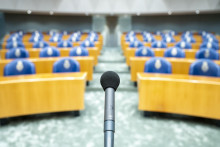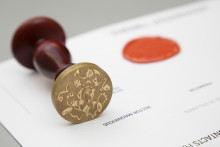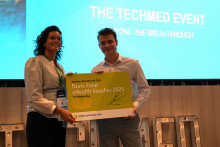The goal of the five-week course (14 March -15 April) is to provide training and a realistic perspective of the proposal process for developing nation energy industry workers, who range from utility company employees to NGO staff and policy advisors to project developers and entrepreneurs. The course focuses on the Clean Development Mechanism (CDM), a Kyoto protocol mechanism designed to reduce greenhouse gas emissions by crediting developed countries' participation in developing countries' clean energy projects. The course tries specifically to bridge the gap between applicants and donors, by teaching how to work out the different components of a proposal. Two groups of students make up the 21-member group: 12 international master's students in Environmental and Energy Management (MEEBA) and nine independent workshop participants.
Masego Kealotswe is a master's student from Botswana working on the proposal PV Electrification in Rural Areas in a Developing Country. `The purpose is to empower unemployed women with entrepreneurial skills using solar powered refrigerators. The project developer is the Department of Energy. The course is a real eye-opener for me as a government employee in my country. It is really widening my scope of thinking in projects.'
Adriana Camino from Peru combines a master's in hydraulics engineering with MEEBA to work on her proposal: Decision Support Scenarios for Patzcuaro Basin: Alternatives of Environmental Restoration using a Water Evaluation and Planning System. `The proposal addresses natural resource exploitation in the Patzcuaro Basin (Morelia, Mexico) where there are complex problems of deforestation, erosion, solid waste generation, incipient contamination, overexploitation of aquifers as well as social conflicts. All of these generate substantial environmental deterioration that affects the main economic activity in the basin: tourism. We are trying to coordinate with the Mexican Institute of Water Technology, who has nine current projects for Patzcuaro Lake Restoration.'
Lana Manaligod, a 5-week course participant, is working on a landfill gas project for electricity generation. She hopes to implement this idea in the Philippines where there is an enormous amount of landfill gas potential. `I believe the highlight of the course is the formulation of the project proposal where we can apply what we have learned during the past weeks.' Another workshop participant, Sattya Bhattacharjee, from Bangladesh, is working together with a Sri Lankan colleague on a similar proposal: Generation of Electricity from Landfill Gas using Municipal Waste. `Only 20% of the population has access to electricity in Bangladesh; we would like to produce one megawatt of electricity with this project. The project will be the first in Bangladesh to extract and utilize landfill gas for electricity generation on a commercial basis. As a pioneering project, it will contribute significantly to the sustainable development goals of Bangladesh.'
The participants all agree that the experience has been worthwhile in and out of the classroom. Camino attests, `The course has given important academic and living experiences. The academic level was particularly good and the environment of Macandra - the building in which all the MEEBA international master's students live - is enriched with people from all over the world. In particular, the campus of the University of Twente is big and full of activities that we can enjoy in our free time.'

left to right - Lana Manaligod, Sattya Bhattacharjee, Masego Kealotswe, Adriana Camino.







